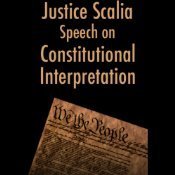- Joined
- Mar 6, 2019
- Messages
- 34,447
- Reaction score
- 34,772
- Location
- PNW
- Gender
- Male
- Political Leaning
- Other
Book review, Washington Post:
“Against Constitutional Originalism” by historian Jonathan Gienapp could fundamentally reorient how we understand America’s founding.
"What are the chances that, in 2024, a new book could fundamentally reorient how we understand America’s founding? Jonathan Gienapp, a historian at Stanford, has written such a book in “Against Constitutional Originalism: A Historical Critique.” You read it, and you get vertigo.
Americans have long shared the following view: The United States Constitution consists of a text. You can find it. You can print it and hold it. It’s an object.
Sure, we argue about how to interpret it. Some people, including Justices Clarence Thomas, Neil M. Gorsuch and Amy Coney Barrett, are “originalists.” They believe that the meaning of the text should be settled by reference to its “original public meaning.” They do not believe in a “living constitution,” whose meaning shifts over time. Over the last generation, originalism, as an approach to constitutional law, has been elaborated and developed (and promoted) with great care.
....
Whatever their differences, all sides agree that the Constitution is a text, a thing, and that its words are the object of interpretation. Against this background, Gienapp’s book comes as a thunderclap. It is directed above all at originalists, who, in his view, misunderstand the founding — not a little but a lot. And although contemporary nonoriginalists are not Gienapp’s target, he has a lot to say to them as well.
It is important to emphasize that Gienapp’s enterprise is one of history, not politics. He is not claiming, for example, that Roe v. Wade was right and that the Supreme Court was wrong to overrule it. He is arguing instead that the past is a foreign country, and we have a lot of trouble understanding it. He thinks that originalists (and most of the rest of us) haven’t got a clue."
This has been my position for years. I'm reading Justice Breyer's book, Reading the Constitution. Now I have to get this one.
“Against Constitutional Originalism” by historian Jonathan Gienapp could fundamentally reorient how we understand America’s founding.
"What are the chances that, in 2024, a new book could fundamentally reorient how we understand America’s founding? Jonathan Gienapp, a historian at Stanford, has written such a book in “Against Constitutional Originalism: A Historical Critique.” You read it, and you get vertigo.
Americans have long shared the following view: The United States Constitution consists of a text. You can find it. You can print it and hold it. It’s an object.
Sure, we argue about how to interpret it. Some people, including Justices Clarence Thomas, Neil M. Gorsuch and Amy Coney Barrett, are “originalists.” They believe that the meaning of the text should be settled by reference to its “original public meaning.” They do not believe in a “living constitution,” whose meaning shifts over time. Over the last generation, originalism, as an approach to constitutional law, has been elaborated and developed (and promoted) with great care.
....
Whatever their differences, all sides agree that the Constitution is a text, a thing, and that its words are the object of interpretation. Against this background, Gienapp’s book comes as a thunderclap. It is directed above all at originalists, who, in his view, misunderstand the founding — not a little but a lot. And although contemporary nonoriginalists are not Gienapp’s target, he has a lot to say to them as well.
It is important to emphasize that Gienapp’s enterprise is one of history, not politics. He is not claiming, for example, that Roe v. Wade was right and that the Supreme Court was wrong to overrule it. He is arguing instead that the past is a foreign country, and we have a lot of trouble understanding it. He thinks that originalists (and most of the rest of us) haven’t got a clue."
This has been my position for years. I'm reading Justice Breyer's book, Reading the Constitution. Now I have to get this one.





